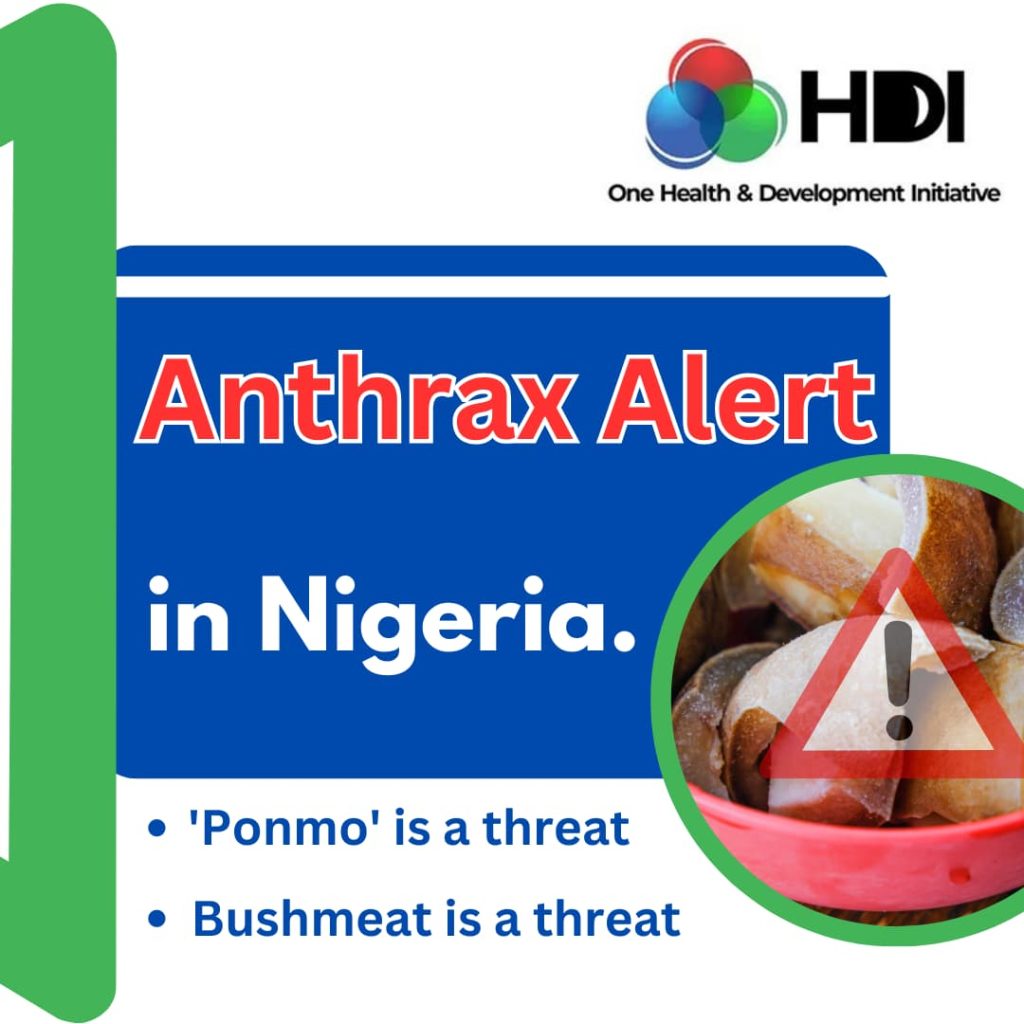
Anthrax has presented itself as a huge One Health challenge again and again. It is so because its transmission chain encompasses factors of the environment, animals, and human beings. It is thus important that interventions to tackle anthrax outbreaks embody a consideration of the environment within which such an outbreak has happened, the affected animals, and human practices to deal with such an outbreak.
Anthrax is a bacterial disease caused by the spore-forming bacterium, Bacillus anthracis. It is a zoonotic disease and is prevalent in several countries in Sub-Saharan Africa, posing a significant health risk to humans and animals. Additionally, Bacillus anthracis has always been high on the list of potential agents with respect to biological warfare and bioterrorism, having been used in that context on at least two occasions (WHO, 2023). Anthrax is transferred from infected animals to humans, as its spores could be found in the soil. Anthrax primarily affects animals such as cattle, goats, and sheep, and is also reported in dogs. The disease can be transmitted to humans through direct contact with infected animals or their products. Contracting anthrax typically occurs when individuals are exposed to contaminated animal products, through either ingestion, inhalation, or skin exposure. Consuming contaminated meat or by-products, such as hides or smoked meat, can introduce the bacteria into the human body, leading to infection.
Skin infection is the most common form, where people become infected handling animals or animal products that contain spores. Clinical Manifestation usually occurs between 1-7 days after exposure from the spores. The signs include small blisters or bumps (which can be itchy), swellings, painless skin sore (ulcer), most often the sore will be on the face, neck, arms, or hands, Myalgia, headache, Fever, Vomiting and Nausea.
People who are most predisposed to this form of infection are veterinarians, agricultural workers, livestock producers or butchers dealing with sick animals, or when in contact with infected hides and wools. Hand hygiene (i.e. washing) should be practiced if in contact with any suspected infected animal or animal products immediately with soap and water.
In recent reports, neighboring countries such as Northern Ghana bordering Burkina Faso and Togo have experienced outbreaks of anthrax, prompting the Federal Ministry of Agriculture and Rural Development (FMARD) to issue a cautionary advisory to Nigerians on the consumption of specific foods like cowhides (ponmo), smoked meat, and bush meat due to the potential contamination with anthrax. The consequences of anthrax infection can be severe, ranging from flu-like symptoms to more severe manifestations, including: respiratory distress, internal bleeding, and even death.
To minimize the risk of anthrax transmission, it is essential to ensure proper meat handling and processing practices, including: adequate cooking temperatures to destroy the bacteria. Additionally, raising awareness among the population about the dangers associated with consuming potentially contaminated animal products can help mitigate the risk of anthrax infection. The Federal Ministry of Agriculture and Rural Development’s cautionary statement serves as a vital reminder to the public to prioritize food safety and adhere to recommended guidelines to prevent the transmission of anthrax. By adopting appropriate preventive measures and promoting awareness, the impact of anthrax outbreaks can be minimized, safeguarding the health and well-being of the Nigerian population.
Anthrax, a dangerous infection, has raised concerns. Therefore, there is an urgent need for action to prevent its spread. While infected animals cannot be vaccinated, it is important to intensify vaccination of uninfected animals in Border States like Sokoto, Kebbi, Niger, Kwara, Oyo, Ogun, and Lagos, due to their proximity to Burkina Faso, Togo, and Ghana. All other Nigerian states are also advised to participate in this crucial exercise warned by the Federal government (Punch, 2023).
To combat infection, infected carcasses or animal products must be deeply buried in the soil, along with burial equipment treated with chemicals that can kill the Anthrax spores. Fortunately, an effective prevention method exists in the form of annual vaccinations with anthrax spore vaccines. Vaccination in endemic areas is very important (WOAH, 2023). These vaccines are readily available at the National Veterinary Research Institute in Vom, Plateau State. They are affordable and easily accessible, providing a vital means of disease prevention and control in animals (NVRI, 2023).
In conclusion, anthrax remains worryingly a threat to the health of animals and man, which in most cases happens when farm animals stay in an environment with pastures/ soil surface that contains anthrax spores. It is thus important that we incorporate the One Health approach in interventions that seek to deal with anthrax like limiting contact of wild animals with domestic ones, vaccinating animals against anthrax, refraining from eating bush meat and infected animal carcasses, and also cooking meat properly to kill the bacteria.





